Attended 16th Global Peter Drucker Forum
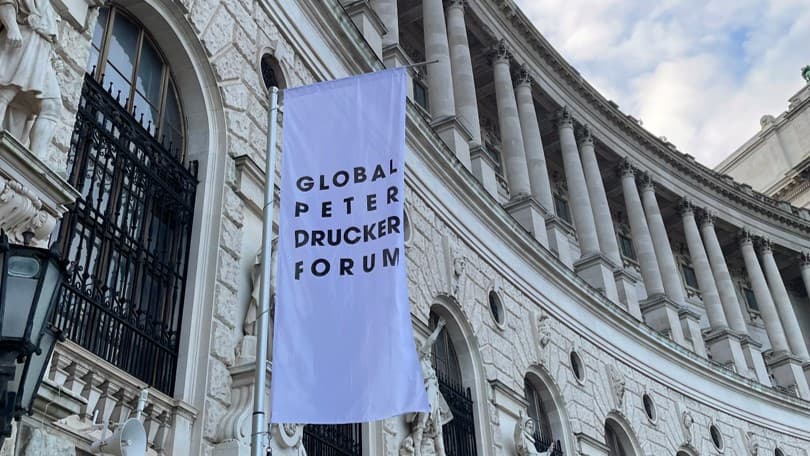
On the 7th, the Group for Pax Japonica of our Institute held the “2024 IISIA-Europe Business Trip Report Meeting” exclusively for members of the membership service “Takeo Harada Gemeinschaft”. In this blog, I would like to share selected contents of the session with our readers.
To begin with, the overseas business trips conducted by the Group for Pax Japonica of our Institute in 2024 are as follows.
●April 22 (Mon.) and 23 (Tue.): Attended the World Economic and Water Forum in Rotterdam, the Netherlands
●April 24 (Wed.) and 25(Thu.): Attended the United Nations University AI Conference in Macau
●October 14 (Mon): Attended the Global Green Growth Institute (GGGI) Conference in Seoul, Korea
●November 12 (Tuesday): Courtesy call to the International Criminal Court (ICC) in The Hague, the Netherlands
●November 14 (Thursday) and 15 (Friday): Attendance at the 16th Global Peter Drucker Forum in Vienna, Austria
As mentioned above, the Institute is not only working to expand its scope as an independent think tank through domestic meeting, but also international meetings. The main purpose of the business trip last November was to build contacts abroad in order to realize our vision “Pax Japonica”. I went to a courtesy call to ICC(International Criminal Court) on November 12 in the Hague in the Netherlands, and on November 14 and 15, I participated in the 16th Global Peter Drucker Forum (hereinafter referred to as “Drucker Forum”) held in Vienna, Austria. More than 500 people from 68 countries attended the forum, which was not only a networking opportunity but also a chance to explore topics of interest to executives and management scholars around the world, as well as the skills that will be needed in the future.
The International Criminal Court (ICC) was established in July 1998 at the United Nations Diplomatic Conference in Rome, which adopted the ICC Statute. The head of ICC is Ms. Tomoko Akane, a Japanese judge from last March. The number of States Parties to the ICC is 124, and is expected to increase to 125 with the accession of Ukraine in January 2025.
(Photo 1: International Criminal Court)
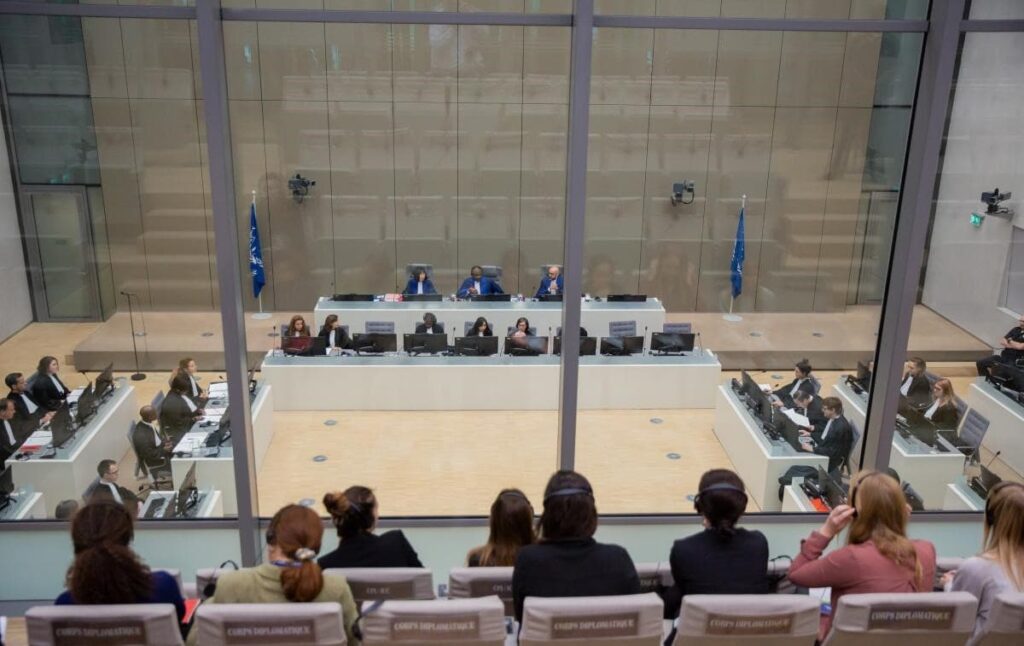
(Reference: website of the International Criminal Court)
The ICC is a specialized court for the following four crimes,
(1) Genocide
(2) Crimes against humanity
(3) War crimes
(4) Crimes of aggression
In addition, in order for the ICC to initiate an investigation, one of the following must apply,
(1) Request from a State Party
(2) A request from the UN Security Council
(3) A motion by the ICC Prosecutor and authorization by a judge.
In addition, crimes committed in the territory of a State Party or by nationals of a State Party are also conditions for conducting an investigation.
In addition, the following four elements are necessary for the ICC to know
(1) The individual must be held criminally responsible
(2) It is specialized in the above four specific crimes
(3) It is established by an international treaty.
(4) It must be complementary to domestic courts.
In particular, (4) “complements domestic courts” is indicated as “assists domestic courts”, because the ICC sometimes undertakes and initiates investigations into matters that countries are unable to adjudicate domestically. On the day of the courtesy visit, this part was mentioned multiple times.
The International Court of Justice (ICJ), which has a similar name, also exists in The Hague, the Netherlands, but while the ICJ is part of the UN, the ICC is an independent body and therefore not part of the UN. However, it is true that the ICC has concluded an agreement with the UN based on the Rome Statute and has established an ongoing cooperative relationship with the UN. When I visited the ICC, the medal of the second Secretary-General of the United Nations, Dag Hammerskjold, which was awarded to the ICC in 2013 (the highest honor bestowed on UN peacekeepers) was on display, indicating that the ICC has significant ties with the UN.
In addition, the arrest warrants issued to President Putin and to Prime Minister Netanyahu, which are now widely reported in the news, were issued by the ICC, and it can be said that attention to the ICC is increasing day by day. We consider ourselves lucky that we were able to visit the ICC before such global news coverage, and we will continue to build a solid network of contacts as the social contribution project.
Next, on November 14 and 15, I attended the 16th Global Peter Drucker Forum held at the Hofburg Palace, the former royal residence of the Habsburgs. The theme was “The Next Knowledge Work -Managing for New Levels of Value Creation and Innovation-.
The Peter Drucker Society Europe was founded in Austria in 2009, the 100th anniversary of Peter Drucker’s birth, and held the first Global Peter Drucker Forum in the same year. The Drucker Forum is an annual management conference and is known as the “World Forum of management” as World Economic Forum. This is actually the third time for our Institute to participate in the Forum, the last time being in 2019, when Takeo Harada, President of our Institute and the Institute’s staff participated.
(Photo 2: Drucker Forum)
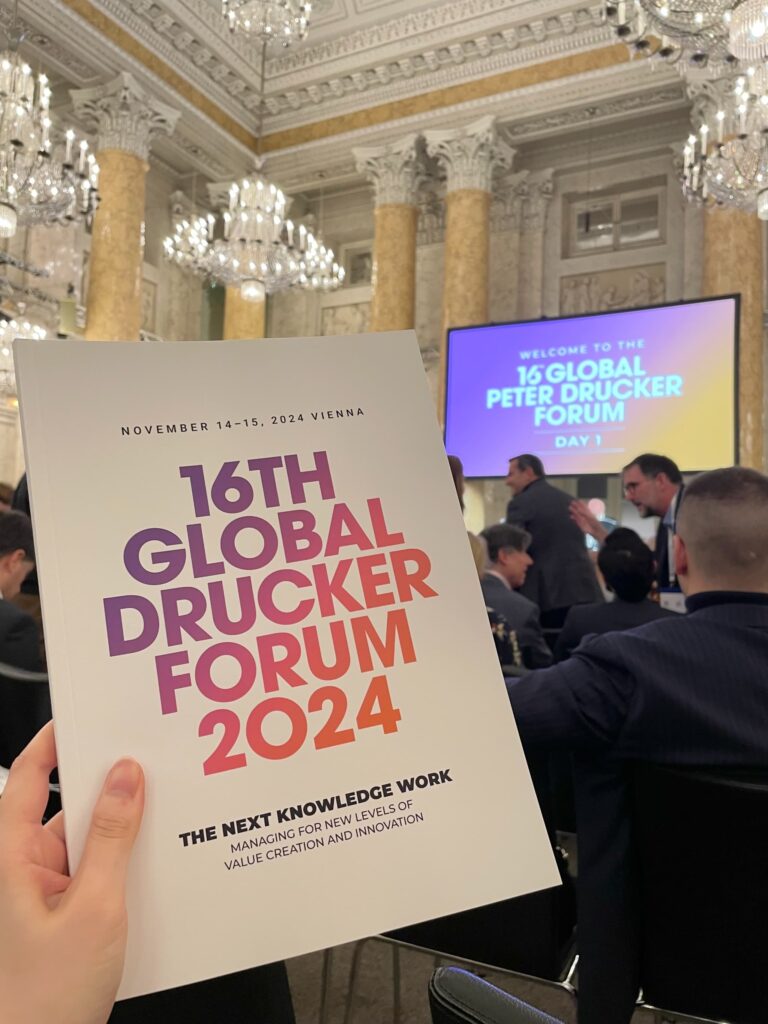
(Reference: Photo by the author)
In the IISIA Monthly Report of September 2013, the column “Takeo Harada’s Book recommendation (No.47) pp.19-23” included the article “Management” written by Peter Drucker. Drucker’s words quoted in the report were as follows:
“The question is: ‘Where is the stage at which an organization should transform itself from a skin to a skeleton?’ In terms of the number of employees, it is somewhere between 300 and 1,000. …In a research institute, it is somewhere between 20 and 25 people. When management is absent, the organization becomes unmanageable and the plan is not implemented. At worst, each part of the plan is carried out at its own time, at its own speed, with its own objectives and goals. Or, being liked by the boss becomes more important than achieving results. No matter how good the product is, how capable and dedicated the employees are, or how powerful and attractive the boss is, unless the organization is transformed into a management structure, it will continue to fail, stagnate, and start going downhill.”(Translated by Japanese.)
Takeo Harada, President of our Institute, wrote in the same Monthly Report, “Management is the ultimate task for managers, and the only way to get there is to confront human resources. In the Drucker Forum, I recalled hearing the term “HR (human resource)” mentioned many times.
Next, let me give you an overview of the Forum, which was divided into two days, and the speakers for each day were as follows
Thinkers 50 #1: Amy Edmondson
Thinkers 50 Award: Gianpiero Petriglieri
Professor and former President of the Rotman School of Management, University of Toronto: Roger Martin
Ania Wieckowski-Masinter, Editor-in-Chief, Harvard Business Review Press
Head of Global Innovation, Visa: Valla Vakili
OECD Permanent Director: Josee Touchette
Senior Advisor, UNIDO DS, AI: Ashraf Abushady
Professor of Evolutionary Psychology, Oxford University: Robin Dunber …etc.
The Thinkers 50, also known as the “Academy Awards of Management,” is an initiative to broadly introduce management thinkers who have had a major impact on the world, with rankings announced every other year. The Drucker Forum featured a very distinguished lineup of speakers, including Professor Amy Edmondson, one of the “world’s most influential thinkers,” and Professor Gianpiero Petriglieri, who was also selected for the Thinkers 50.
(Photo 2: A scene from the session)
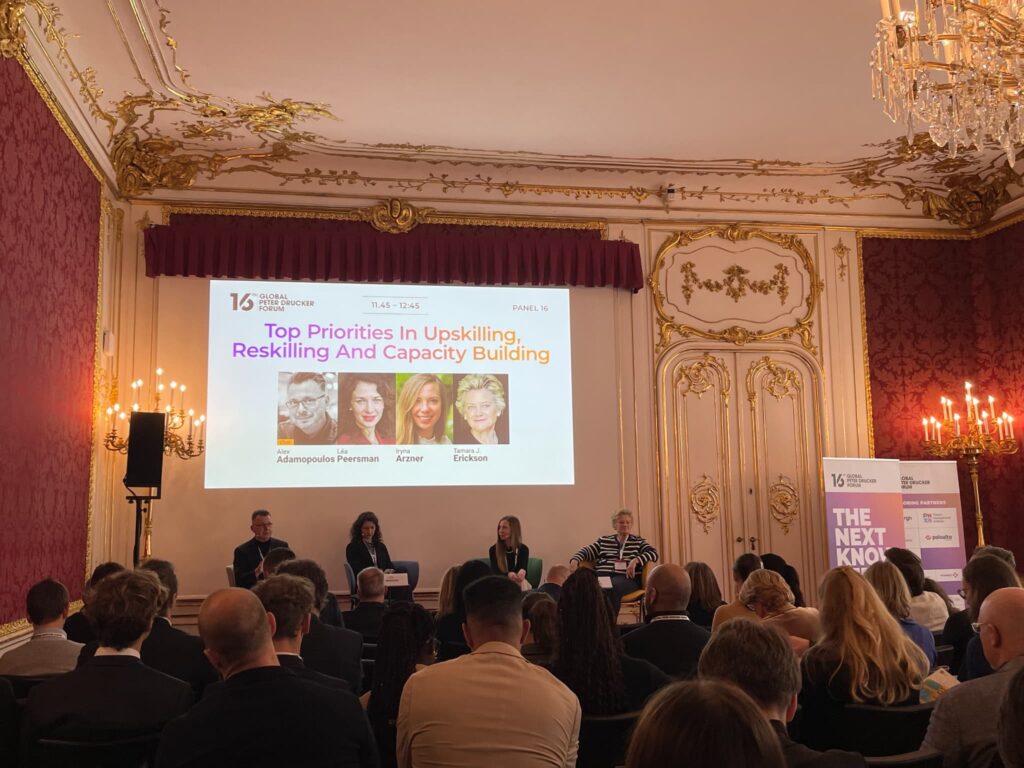
(Reference: Photo by the author)
On the day of the forum, the venue was divided into three sections, where panel discussions and debates were held simultaneously. Participants chose viewing lectures according to their interests. The author also carefully selected sessions that were presumed to be closely related to the Institute’s analysis from the 28 sessions, and listened to the debates and sessions.
Summing them up, what I feel was the focus of attention at this Drucker Forum was “We are living in the Golden Age of Knowledge Work”. Following is what I picked up as important topics through the Forum.
1. Human and AI
2. Innovation and Creation
3. People First, Finance Second.
In other words, “In this age of AI, what should we, as humans, focus on?” “What skills are needed for innovation and creation?” “Innovation can only be created when companies ensure the psychological and physical safety of the ‘people’ who work there, rather than thinking first and foremost about profit.” I strongly felt that the session was conducted based on the argument that “this is the success of a company”.
Finally, I would like to introduce the words of Amy Edmondson, a professor at Harvard Business School, who won the first prize in the Thinkers 50.
(Photo 3:Speech of Professor Amy Edmondson)
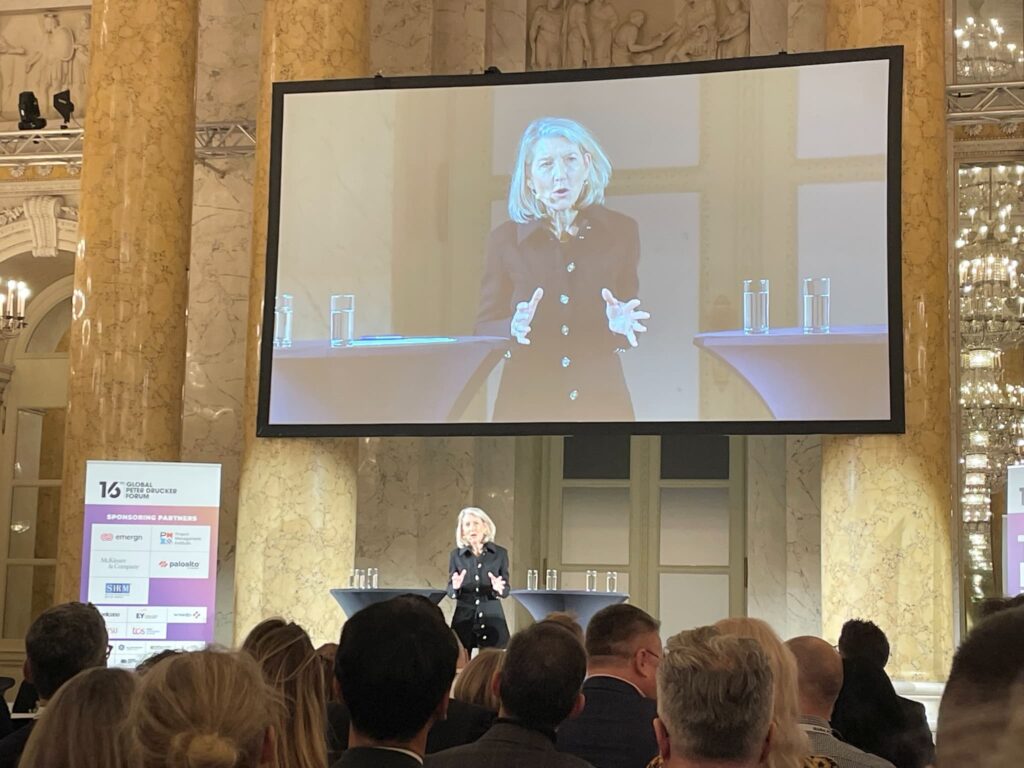
(Photo 3: Photo by the auther)
“In order to prevent preventable mistakes (i.e., stupid mistakes), we need to take smart risks and ensure that we are doing our part as managers and colleagues. Workers seek psychological safety from companies, which is different from ‘comfort’. It is important to have the willingness to air one’s views when necessary, especially if one determines that preventable failures will occur.”
She continued as follows.
“Professor Amy Edmondson calls the ‘failures’ that result from such wise risk-taking ‘Intelligent Failures’, because failures are an investment in oneself, not in others. Failures are an investment in oneself, because they lead to learning. It is this experience of intelligent failure that helps great managers, the knowledge workers who create new things.”
“We need to be aware that public opinion often trumpets the structure of company vs. employee, manager vs. other employees. There is always a framework of pitting the two against each other, but this doesn’t work. Good management goes beyond this to consider the people who live in the community and grow it into a sustainable community. When combined with collaboration, designing based on the needs of customers, society, and the world, and thinking about how to produce it, it transforms a complex, but actually manageable, challenge.”
The forum concluded with the statement, “We should know more about Human Being, and Work for Talent,” to which the audience gave a resounding round of applause.
Some of the speeches from the day are available on YouTube, with the opening session featuring the above-mentioned Professor Amy Edmondson and Professor Gianpiero Petriglieri, who was also selected for the Thinkers 50, receiving the most attention. We hope you will feel the power of their words.
(Video 1: Drucker Forum)
(Reference: From YouTube)
Finally, the essential elements for “workers” in this Drucker Forum are: “Acquire new skills, Solve new problems, Expand their contribution, and Grow their income.”
As some of you may know or are involved in, on November 3, at the request of Higashihiroshima City and Hiroshima University(Department of Health and Sports, Faculty of Education), Takeo Harada, President of our institute, gave a special lecture at the “Hiroshima University 75+75th Anniversary and Higashihiroshima City 50th Anniversary Commemoration Special Lecture” entitled “The world’s easiest lesson on reskilling and entrepreneurship”.
In this lecture, he mentioned the basics of “skill development,” or in another word “reskilling” and “entrepreneurship,” which were clearly identified as essential elements for “workers” in the Drucker Forum. The content of the lecture was clearly a very hot topic, so much so that it was even taken up at the “World Forum of Management” held in Europe. The lecture is also available for free on YouTube, so please take a look.
(Video 2: The World’s Easiest Lesson on Risk-Related Business and Entrepreneurship)
(Lecturer: Takeo Harada, CEO of IISIA)
(Reference: From YouTube)
The “2024 IISIA Europe Business Trip Debriefing” was conducted as part of the Institute’s social contribution project. The Institute intends to continue to communicate vigorously with key institutions at home and abroad. We believe that this trip was also a boost to this effort, and that this is our role in realizing the Vision “Pax Japonica”.
Chancellery Unit, Group for Project Pax Japonica, Maria Tanaka
※The statements in this blog are not the official views of the Institute, but rather the personal views of the author.


